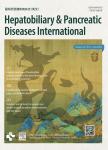Primary biliary cholangitis in pregnancy:A systematic review with meta-analysis
Primary biliary cholangitis in pregnancy:A systematic review with meta-analysis作者机构:Department of Gastroenterology and HepatologyNepean HospitalPenrithNew South WalesAustralia Nepean Clinical SchoolThe University of SydneyPenrithNew South WalesAustralia NHMRC Centre for Research Excellence in Digestive HealthHunter Medical Research InstituteThe University of NewcastleNewcastleNew South WalesAustralia
出 版 物:《Hepatobiliary & Pancreatic Diseases International》 (国际肝胆胰疾病杂志(英文版))
年 卷 期:2022年第21卷第3期
页 面:218-225页
核心收录:
学科分类:1002[医学-临床医学] 100211[医学-妇产科学] 10[医学]
主 题:Pregnancy Fetal Maternal Primary biliary cholangitis Miscarriage
摘 要:Background: The outcomes and disease associations in pregnant women with primary biliary cholangitis(PBC) have not been largely explored. This study aimed to determine the level of evidence associated with maternal and fetal outcomes and other disease associations in female patients with PBC. Data sources:: A comprehensive literature search was conducted. Maternal and fetal outcomes were obtained from patients with a previous, current or subsequent diagnosis of PBC. A random-effects model was employed, using odds ratios(ORs) with 95% confidence intervals(CIs). Results: Eleven studies, with 2179 female PBC patients were included. Pregnant women with PBC were significantly more likely to have a miscarriage(OR = 1.27, 95% CI: 1.02-1.58;P = 0.03), and a history of abortion(OR = 1.50, 95% CI: 1.09-2.07;P = 0.01), with absent heterogeneity( I 2 = 0%). PBC pregnant women were significantly more likely to deliver via vaginal birth(OR = 1.69, 95% CI: 1.33-2.14;P 0.001) with low level heterogeneity( I^(2) 0.001%). Patients had a statistically significant increased likelihood of lifetime smoking(OR = 1.95, 95% CI: 1.17-3.23;P = 0.01). Egger’s regression revealed no evidence of publication bias. Conclusions: This meta-analysis provides pooled evidence that a PBC pregnancy is associated with fetal morbidity and maternal lifestyle associations that may influence pregnancy outcomes. More studies are needed to establish disease associations that may directly affect pregnancy outcomes. These data are essential for clinicians managing these patients before, during or after pregnancy.



